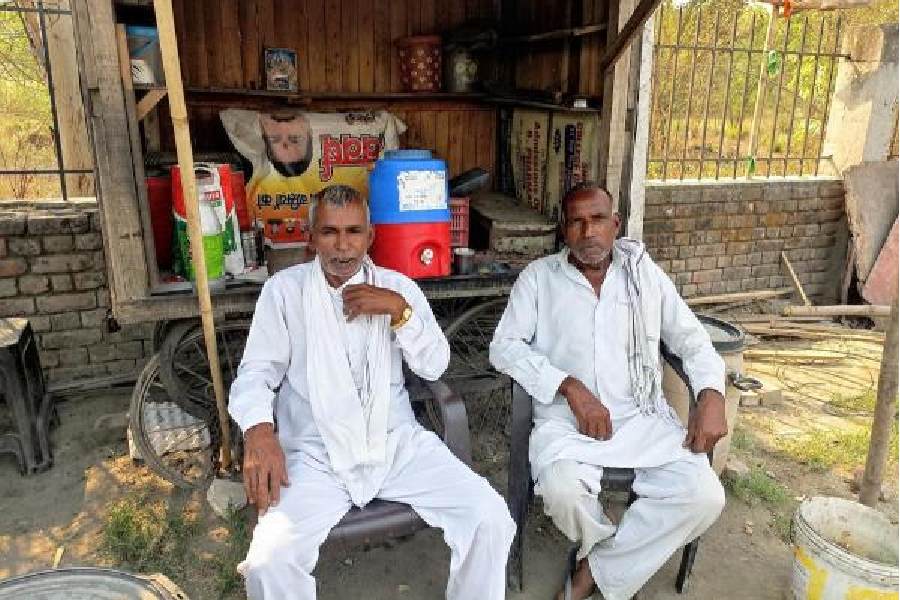As the mercury touches 45°C in Karnal, the Jat heartland, 61-year-old Pala Ram is busy serving steaming cups of tea at his makeshift tea stall on a pavement in Baldi village.
Suddenly, a BJP cavalcade with supporters chanting “Bharat Mata ki jai” rolls past the stall and enters the village.
“Iss baar to mamla saaf hai (Things are clear this time),” said Pala Ram.
Asked what he meant, Pala Ram replied after a pause: “Samvidhan badalne nahin denge. Iss sarkar ko jhatka dena zaroori hai (We will not let anyone change the Constitution. This government needs to be given a jolt).”
“Patrakar ka matlab hai sarkar se bhi sawaal karna aur poochna. Jo ab nahi ho raha hai (Journalists are also supposed to question the government, which is not happening now.” he said sarcastically.
Pala Ram’s friend Baghu Ram, 62, said: “This time people from our community have decided not to vote for any candidate but to save the Constitution.”
Both Pala Ram and Baghu Ram said they had voted for Narendra Modi in the 2014 and 2019 Lok Sabha elections.
“But now there is a sense of betrayal,” Pal Ram said, adding that the marginalised Hindu castes are very fearful of the “abki baar 400 paar” slogan.
“They want to snatch away our rights given to us by the Constitution,” he added.
Several villagers belonging to the marginalised Hindu castes in Rohtak, Sonepat and Kurukshetra also spoke about such apprehensions and expressed their support for the Congress, which appeared to be the favourite among most Jats.
While the Opposition has long been alleging that Modi plans to alter the Constitution if he returns for a third term, remarks by some BJP leaders have fuelled apprehensions that such amendments would include the axing of reservation that the marginalised castes have been enjoying.
Baldi village falls under the high-profile Karnal Lok Sabha seat where former chief minister Manohar Lal Khattar is pitted against 30-year-old Haryana Youth Congress president Divyanshu Budhiraja.
The BJP, which has been facing farmer anger in the state because of policies widely seen as anti-farmer, replaced Khattar with Nayab Singh Saini as the chief minister owing to “anti-incumbency”.
Farmers have attempted to disrupt the rallies of Khattar and other BJP candidates such as Mohan Lal Badoli (Sonipat), Naveen Jindal (Kurukshetra), Ashok Tanwar (Sirsa), Ranjit Chautala (Hisar) and Arvind Sharma (Rohtak) over the past two weeks.
Khattar and other BJP leaders have routinely faced black flags and slogans from farmers.
Ranbir Singh, a retired policeman, in Karnal said this election was not going to be a cakewalk for the BJP that won all the 10 Lok Sabha seats in the state in 2019 on the back of a nationalist sentiment following the terrorist attack in Pulwama and the subsequent air strikes in Balakot, Pakistan.
“But this time, caste equations, especially the disenchantment among the Jats and the Dalits, the issue of unemployment among youths, the ongoing farmers’ protest and the introduction of the Agniveer scheme in armed forces are posing a serious challenge to the BJP,” he said.
According to him, several BJP candidates, including Khattar, are conducting their campaigns under police protection because of backlash from the farming community.
At Uchani village in Karnal, Anurag Prajapati, an OBC, rooted for the BJP. “We will vote for Modiji. He is doing a lot for the country and we want to give him a third term.”
The state’s caste dynamics are intricate with three communities — Jats, Scheduled Castes and Other Backward Classes (OBCs) — as the major players. The agrarian Jat community wields considerable political influence constituting a substantial 29 per cent of voters. Dalits form the second significant caste group in the state, constituting 20 per cent of the state’s population.
Considering the anti-incumbency, the BJP’s strategy is to focus on non-Jat voters.
“After polarising voters along religious lines in several parts of the country, the BJP in Haryana is focusing on polarisation along caste lines. What happened to their ‘Viksit Bharat’ campaign,” Karamveer Singh, a trader in Karnal, said.
The non-Jats seem to be rooting for the BJP. The dominance of the Jats in farming and politics seems to have led to resentment among the others who believe the BJP has offered them a chance to take on the rival caste.
The BJP’s strategy is to bag the votes of the non-Jats and divide the Jats, emerging as the sole representative of OBCs, Dalits and other non-Jat communities.
All 10 seats in Haryana go to polls on May 25











